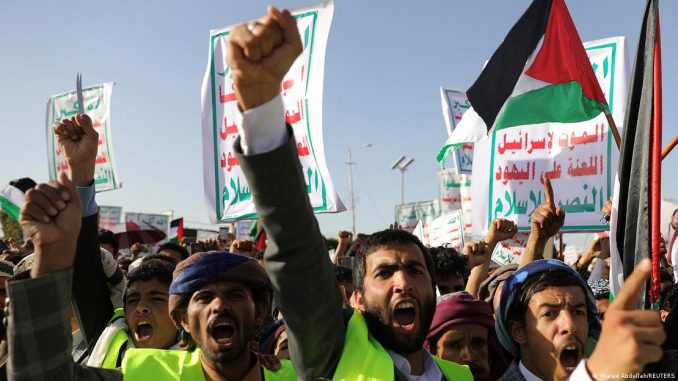
Iran has vowed to retaliate for an attack on its diplomatic buildings in Syria, likely by Israel. Options include everything from further attacks by Iran’s regional proxies to all-out war.
As soon as the pictures of destroyed buildings, part of an Iranian embassy complex in the Syrian capital, Damascus, turned up online, the question was asked: How would Iran react?
The airstrike killed 13 people, according to Iranian state media. This included five officers and two generals of the Iranian Revolutionary Guard. Several Syrians were also killed but have not been identified.
The airstrike on the building, marked “consular section of the Iranian embassy” and apparently closed because of a holiday, was widely attributed to Israel even though Israeli officials did not make any comment on the attack. Israel rarely acknowledges strikes on Iranian targets although other news sources, including the New York Times and Reuters cited anonymous Israeli officials who acknowledged they had carried out the airstrike.
Iranian officials reacted angrily. Iran’s Supreme Leader Ayatollah Ali Khamenei wrote that Israel “will be punished by the hands of our brave warriors” — a statement observers suggested meant retaliation might come directly from Iran, rather than from its proxies.
Iran supports a number of groups around the region with varying degrees of material, military, financial and advisory aid. This includes Hamas in Gaza, the Houthi rebels in Yemen and various militias in Iraq, who have tended to attack US bases there in retaliation for Israeli actions in the past. It also includes Hezbollah in Lebanon, which plays a significant political and societal role in the country and is the most powerful of various Iranian allies.
What will Iran do?
The attack on the embassy complex in Damascus “brings Israel’s confrontation with Iran and Hezbollah to a new pinnacle,” journalist Amos Harel wrote in Israeli daily Haaretz this week. “This may be the most dangerous development on the northern front since the war in Gaza began almost six months ago.”
But so far, Harel continued, it is not Iran or Hezbollah that has been raising the stakes on the Israeli-Lebanese border. “To a large extent it was actually Israel that consistently raised the price it exacted from its northern adversary,” he wrote, explaining that Israel’s target group has expanded as has how far Israeli strikes reach into foreign territory.
Iran knows the rules of the game of “deterrence” it plays with Israel and the US but will be embarrassed if it doesn’t respond, Iraqi researcher and political analyst Hamid al-Kafaei told DW Arabic. However al-Kafaei doesn’t think Iran will respond directly. “Iran … knows very well that there are no limits to any Israeli response,” al-Kafaei said.
Iran isn’t about to do anything major itself, confirms Sharan Tabari, a British-Iranian journalist and an expert on the IRGC based in London. “But it will empower its proxies [to do] more.”
Most of the actions the proxies take could be prevented or undone by Israel, the US or other allies, she explains, pointing to how Houthi attacks on the Red Sea have been countered. “So it will all be small things. But Iran will amplify those for domestic consumption,” Tabari argues.
Courtesy of DW